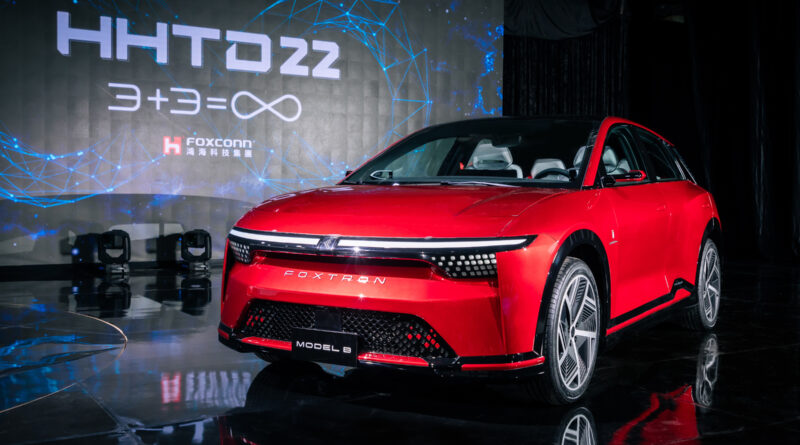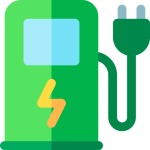
In a move that could reshape Australia’s mainstream EV market, Taiwanese electronics giant Foxconn – best known for assembling Apple’s iPhone – is reported to have struck a deal to build an all-new battery-electric compact SUV for Mitsubishi, with Australian showroom arrivals targeted for the first half of 2026.
The vehicle in question is expected to be based on Foxconn’s Model B, a 4.32-metre high-riding hatch first shown in 2022 under the Foxtron sub-brand with exterior design by Pininfarina. Reports indicate single- and dual-motor variants backed by a 60kWh battery, with a claimed driving range of up to 500km.
At a press conference in Tokyo on April 9, Foxconn executive Jun Seki said the company now has the “toolbox” to design and assemble a full range of EVs in different regions, tailoring each to client needs. Seki explicitly stated the Model B would go on sale in Australia in the first half of 2026, but did not confirm Mitsubishi as the client. Multiple Japanese outlets have already linked the project to Mitsubishi. Mitsubishi Motors Australia declined to comment on the reports, and did not issue a denial.
If confirmed, the Model B could serve as a battery-electric successor to the long-running ASX, while delivering immediate benefits to Mitsubishi’s local arm under Australia’s NVES CO2 reduction scheme. The program incentivises lower-emissions vehicles and could make the Mitsubishi-badged Model B a strategic play as the brand accelerates its electrification plans.
Foxconn’s broader EV roadmap
Foxconn – also known as Hon Hai Technology Group – has unveiled a suite of EVs it is ready to build for global automakers:
- Model B: compact SUV-coupe (Australia-bound)
- Model C: mid-size SUV (US launch scheduled for Q4 2025; already in production as the Luxgen N7)
- Model D: people-mover
- Model E: mid-size SUV-coupe
- Model A: small cargo van
- Model T: large bus
- Model U: minibus
A previously shown Model V dual-cab ute was notably absent from the latest line-up.
The Model C, positioned against the Tesla Model Y, offers a choice of 58kWh or 83kWh batteries, with claimed ranges of up to 500km and 700km respectively (NEDC). Powertrains include a rear-drive single motor (172kW/340Nm) and a flagship all-wheel-drive dual-motor set-up (344kW/680Nm) capable of 0-100km/h in a claimed 3.8 seconds. Advanced features include active air suspension. The Model C began production in late 2023 and is on sale in Taiwan as the Luxgen N7, with US deliveries slated to begin late 2025.
Manufacturing model and partnerships
Foxconn is positioning itself as a B2B contract manufacturer rather than a consumer-facing car brand, aiming to leverage its scale, low-cost, high-quality production, and electronics expertise for traditional carmakers. The company says it intends to work with a broad range of partners, rather than compete with them. Its EVs are already on sale via Taiwan’s Luxgen, although a previous tie-up with US start-up Lordstown Motors collapsed after that company’s bankruptcy.
The reported Mitsubishi deal has reignited speculation about potential collaborations with Nissan and Honda, as Foxconn seeks the production volumes needed to make its automotive division profitable. Foxconn says its EVs share a common architecture and components to spread development costs across multiple models and clients.
What it means for Australia
If Mitsubishi brings the Foxconn-built Model B to local showrooms on schedule in 2026, it would give the brand a much-needed, contemporary EV offering in a crucial segment. With mainstream pricing and range expectations, the model could broaden EV adoption beyond early adopters, while helping Mitsubishi meet tightening emissions targets under the NVES. Confirmation of specifications, pricing, safety features and local tuning will be key milestones to watch in the coming months.
Conclusion
Foxconn’s move into Australian showrooms via a Mitsubishi-badged compact EV marks a significant moment in the convergence of consumer electronics manufacturing and carmaking. With the Model B slated for a 2026 launch and the Model C ramping up overseas, Foxconn’s contract-manufacturing model could accelerate EV availability and competition in Australia. All eyes now turn to Mitsubishi for official confirmation – and to how this partnership might influence broader alliances across the Japanese auto industry.
About EV Evolution
EV Evolution is the leading online platform dedicated to Australian electric vehicle owners and enthusiasts. We foster a vibrant community, delivering essential EV news and insights, and enhancing user engagement through our innovative, AI-powered chatbot for dynamic discussions. Our mission is to empower Australian electric vehicle owners and enthusiasts by fostering a vibrant, AI-driven online community that connects, informs, and advances the nation’s electric vehicle landscape:




 and then
and then 